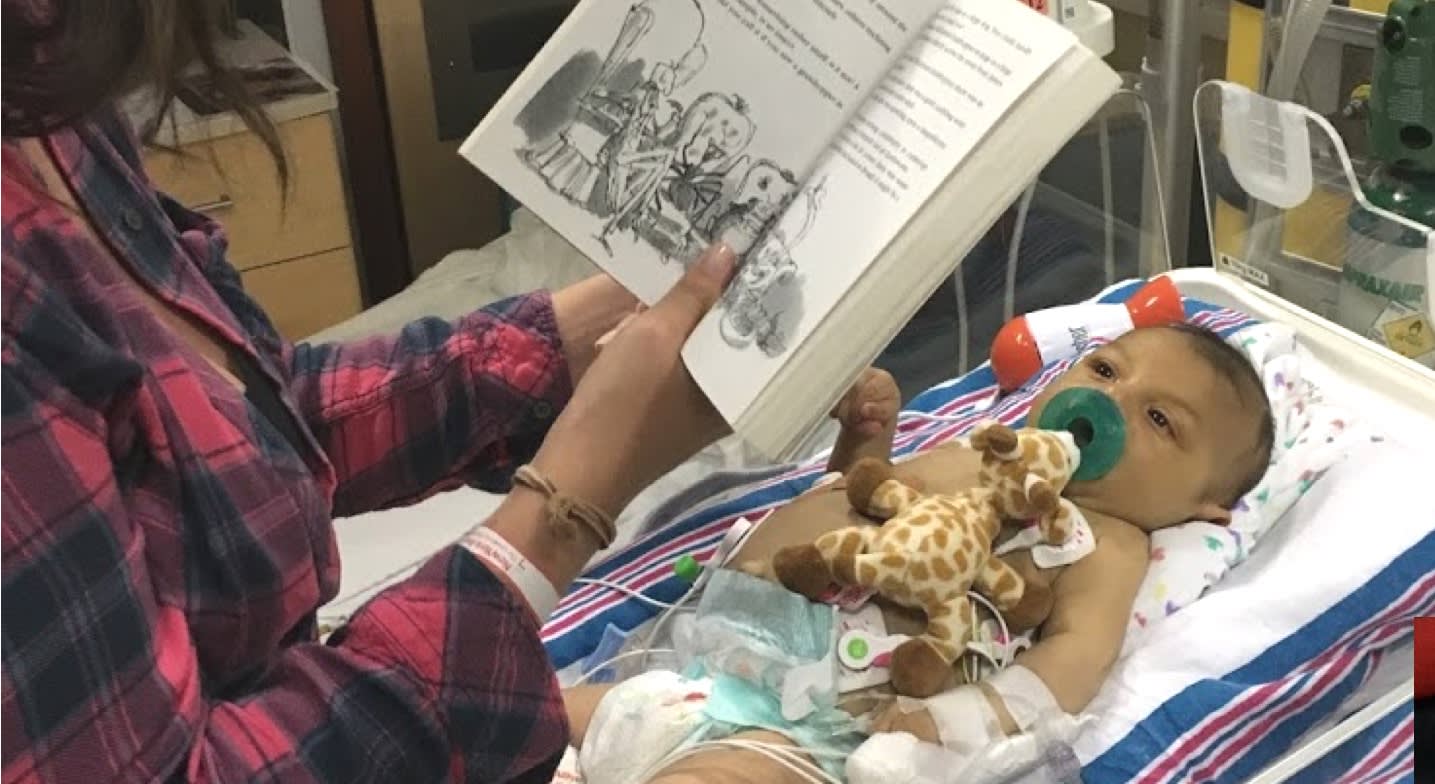Great books find us at just the right time in life. If you believe in the power of words and in the truth of stories, then you can probably name at least one book that fundamentally changed how you thought about life and how you saw yourself. The first book that deeply affected me was The Giving Tree and many have followed; I’ll never forget treasuring Matilda in grade school, or connecting with The Catcher in the Rye when I was a teenager, or the first time reading Raymond Carver’s short fiction in college. At a certain point in life, these books all spoke to me, and I consider it fate, perhaps, that I found them.
And so it was that, in April of this year, my wife and I rediscovered another story that helped us find hope where we could not see any. We were reading Roald Dahl’s fantastical James and the Giant Peach to our two-and-half-month-old son, also named James, on the day we found out his liver was failing and he needed a transplant to save his life.
At first the doctors thought it was nothing, and then, all of a sudden — well, it wasn’t nothing.
From birth, James seemed a healthy, thriving baby, but the jaundice he had as a newborn never went away. At first, the doctors thought it was nothing, and then, all of a sudden — well, it wasn’t nothing. The course of events from that period happened so quickly, so frantically, it all seems now as if we were in some bad dream that we couldn’t shake ourselves out of. One day we were peacefully at home with our son, the next day we were in the ER, and a day after that, following a liver biopsy, we were told James needed a liver transplant. It was all terribly surreal.
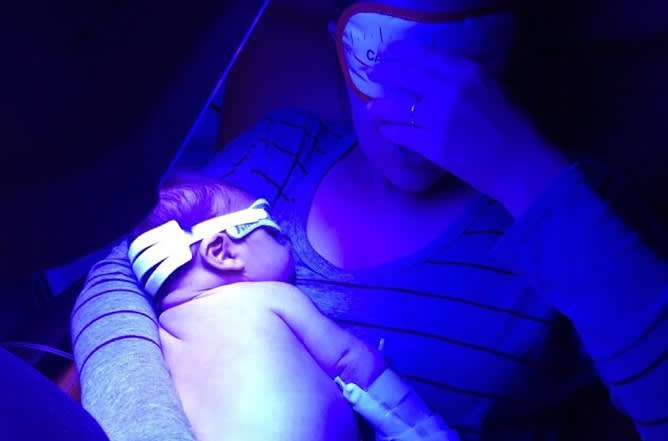
April 21, 2016. James asleep with Mom under the bili lights at Morgan Stanley Children’s Hospital in New York City on the day we were admitted.
He was placed on the national waiting list. When kids are placed on the liver transplant list, they are assigned a PELD score (Pediatric End-Stage Liver Disease) — the higher the score, the more urgent the need and the sooner they will be matched with a donor.
James’s PELD score was so high that it placed him second on the pediatric list in the entire United States. Second. Our hearts collectively skipped a beat when we heard that news, but we also knew that the dire prognosis gave us a better chance to get an organ quickly. And so the waiting began. As a backup plan, I was scheduled to go into surgery to give James a piece of my liver in a process known as living-donor liver transplant. But days after he was placed on the national list, as we literally witnessed life vanishing out of his little body, the doctors told us they’d found a liver for him from a baby who had died in an accident. We may never know who this child was, but I am eternally grateful that a piece of this angel baby will forever live in my son. That afternoon, a surgical fellow flew down to the Southeastern U.S. to get the liver and flew back with it on ice. By 10 p.m., the liver was in the hospital, and by midnight it was in our son.
During our long hospital stay, reading to James became a salvation for us and, I believe, for him. We got through three Roald Dahl books in only our first week there, and reading the newspaper or other stories to him became our default activity on certain days. Because James was stuck with IVs and covered in wires, we could not pick him up, but our voices created a deeper connection than any touch could have. I came to believe that the spoken word has a true healing quality to it. I heard it with my own ears; I saw it with my own eyes.
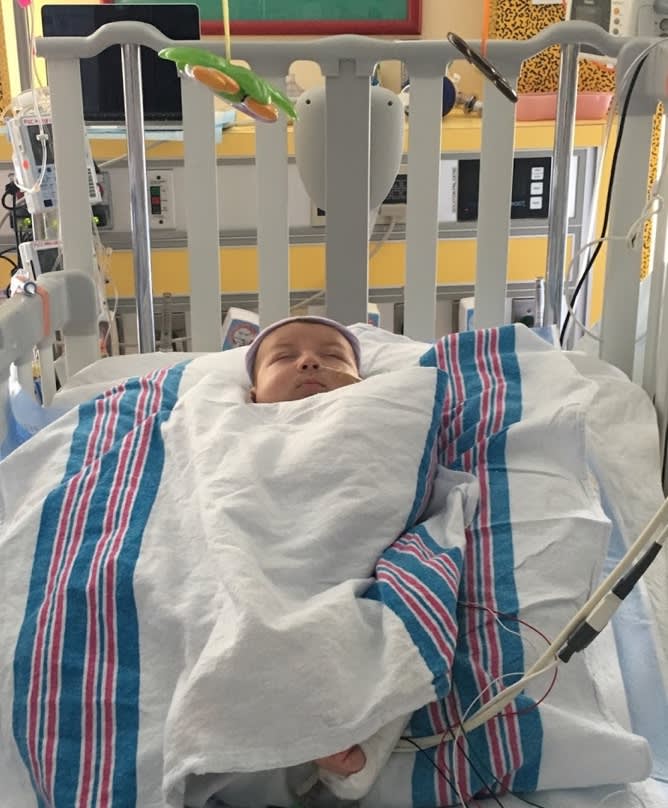
May 14, 2016. Recovering in the Pediatric ICU on the day we went home.
I don’t think I could truly explain what this healing quality was. I couldn’t equate it to the type of physical healing his body went through in the days and weeks following the transplant. This was emotional healing. I could see the healing in the smiles we’d receive from him as we stood and read by his bedside — smiles that were at first faint and infrequent and, over time, grew more pronounced, more assured. In the days before we were hospitalized, James had smiled, even giggled for the first time. Those first external signs of love melted our hearts. After surgery, we felt that we’d forever lost those gifts. But they came back, slowly but surely.
Reading to James, speaking to him, even blowing kisses at him, must have given him comfort. It told him that we were there for him and weren’t going anywhere. Reading was “us” time, a period in the day when he wouldn’t be poked and prodded by doctors and nurses, and getting drawn into a playful book like Dahl’s gave us the release to escape — even momentarily — to another world, which James must have sensed. And so, when we found ourselves in the hospital on what was my wife’s first Mother’s Day, and James smiled, that was the ultimate gift for both of us.
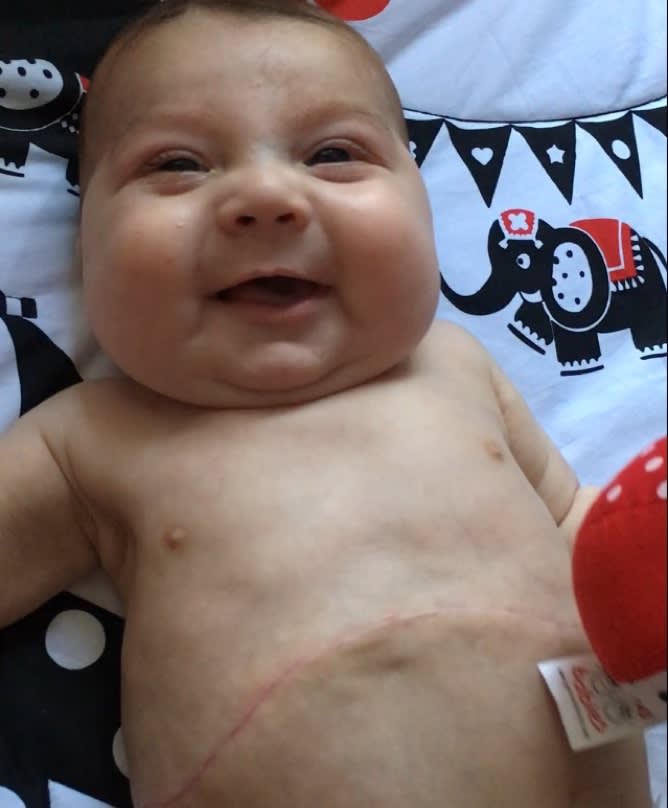
“From every wound there is a scar, and every scar tells a story. A story that says, ‘I survived.’” -Craig Scott
James made it through his transplant and, three weeks and two additional surgeries later, we got him home. I look back on this episode and I’ll never fully understand why this occurred. The odds of something like this happening to a baby are astronomically low. In the U.S., there are close to four million babies born each year — the number of liver transplants performed on children under the age of one is fewer than 100 per year. And yet, we’re lucky James is alive. We’re lucky we landed at the hospital we did, which has one of the best success rates for liver transplants in the world. We’re lucky James had the spirit to keep on fighting. We’re lucky he got a liver.
I’m not sure why we had picked that book versus any other, but we had. The parallels between the stories of this young James and mine seemed more than coincidental, given our circumstances. Both experienced tragedies early in life; underwent semi-miraculous transformations, thereby escaping death; and recovered from their tragedies more whole, more alive.
I do believe he gained strength and comfort by our voices and energy.
There’s a crucial point in the beginning of the novel where James’s life changes suddenly: His parents are eaten by an “enormous angry rhinoceros” and James is forced to move from home and live with his two terrible aunts. His life becomes miserable; he essentially becomes their prisoner until one day when a man appears to James with a bag full of “tiny green things,” the power of which frees James from his terrible situation and propels him on his fabulous adventures.
I don’t suspect that my son James, as we read him this story, followed along with the plot, but I do believe he gained strength and comfort by our voices and energy. For not the first time, and certainly not the last time in my life, a book was there when I needed it. When James learns to read, we’ll read this one together.
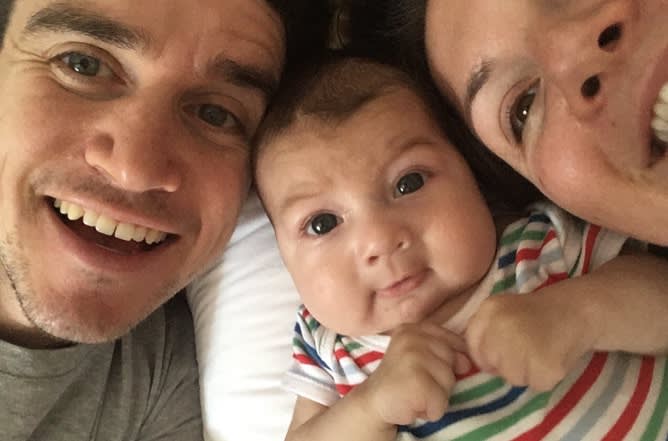
May 28, 2016. James happily at home with Mom and Dad.
